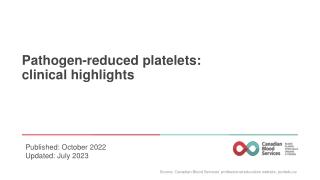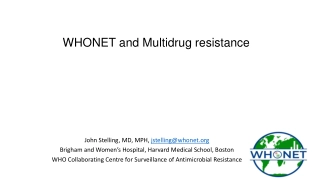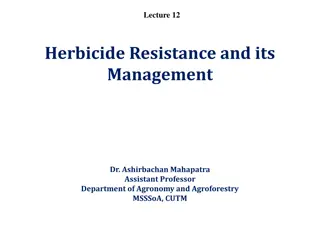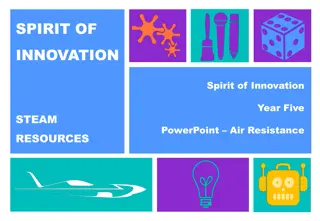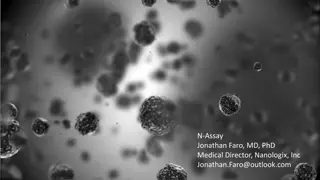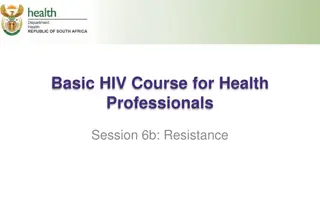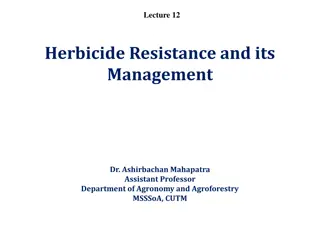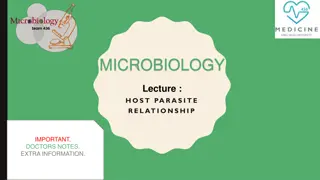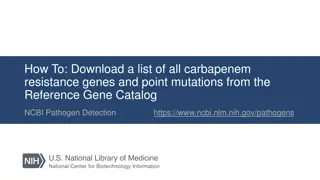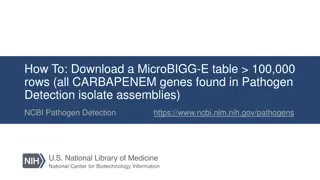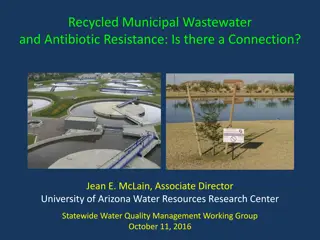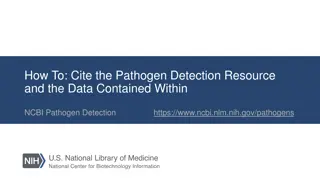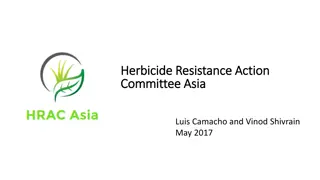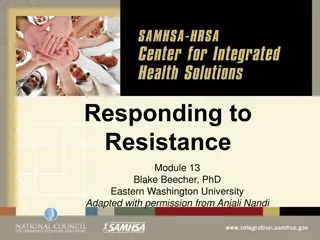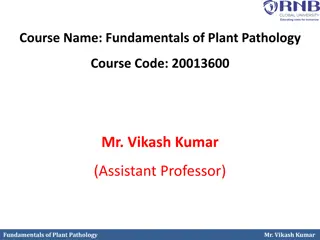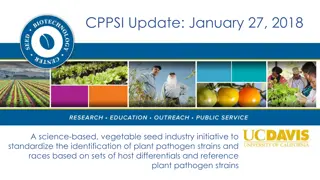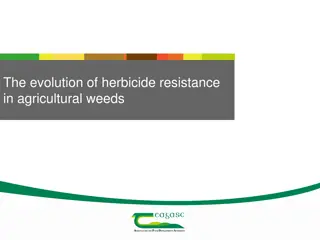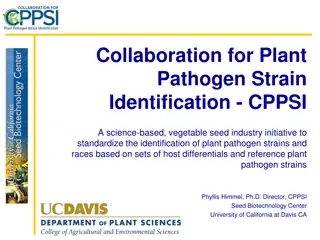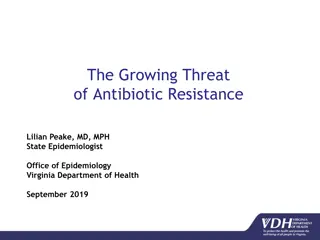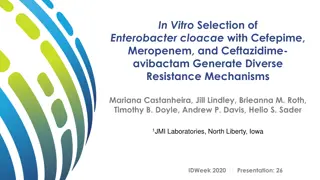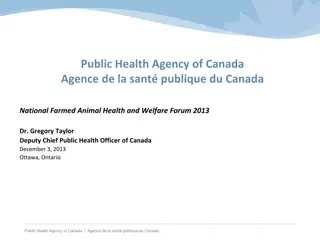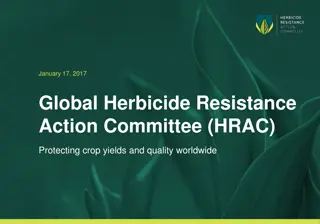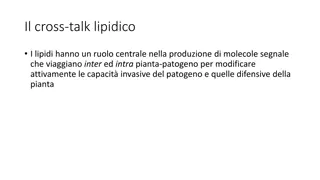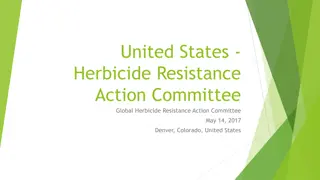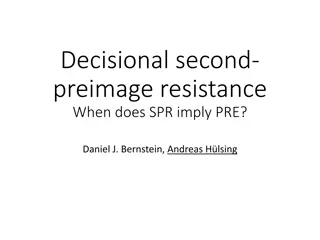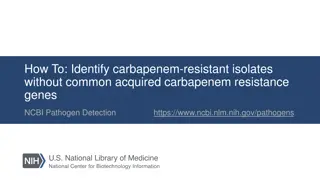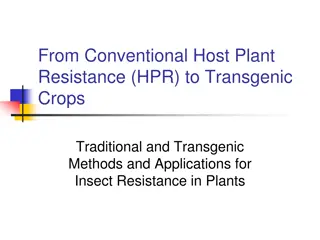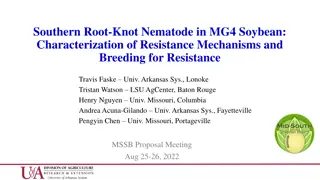Pathogen-reduced platelets: clinical highlights
Pathogen-reduced platelets play a crucial role in reducing the risk of transfusion-transmitted infections through pathogen inactivation technology (PIT). This technology provides an additional layer of safety against various pathogens including viruses, bacteria, protozoa, and leukocytes. Platelet c
2 views • 17 slides
Understanding Multidrug Resistance in Bacterial Infections
Multidrug resistance refers to organisms resistant to multiple antibiotics, impacting therapy decisions, increasing morbidity and mortality, and raising healthcare costs. Monitoring resistance profiles can aid in tracking outbreaks, with molecular typing confirming issues. Join the WHONET Webinar Se
0 views • 35 slides
Update on Pathogen Reduction of Platelets at National Haemovigilance Conference 2023
This update covers the latest developments in pathogen reduction of platelets, including the introduction of whole blood containing platelets. Key strategic initiatives focus on assessing post-collection blood product manipulation processes and developing new products to meet healthcare needs. The a
0 views • 25 slides
Understanding Herbicide Resistance and Management
Herbicide resistance is the inheritable ability of certain weed populations to survive herbicide treatments that would typically control them. This resistance is a natural process, influenced by factors like genetic diversity, herbicide selection pressure, and resistance mechanisms. Effective manage
12 views • 14 slides
Trends in Gonococcal Resistance to Therapies in England and Wales Since 2011 Guideline Change
Antimicrobial resistance in Neisseria gonorrhoeae poses challenges for treatment. This study examines trends in ceftriaxone, azithromycin, and cefixime resistance since the 2011 guideline change in the UK. Data from the Gonococcal Resistance to Antimicrobial Surveillance Programme is analyzed to tra
0 views • 12 slides
Understanding Forces: Gravity, Air Resistance, and Parachutes
Explore the concepts of gravity, air resistance, weight versus mass, and how they relate to objects in motion. Discover how Sir Isaac Newton's discoveries shaped our understanding of forces, and learn how air resistance affects the speed of falling objects. Delve into the mechanics of parachutes and
0 views • 9 slides
Understanding Ohm's Law and Electrical Resistance
Explore the principles of Ohm's Law and electrical resistance, understanding how resistance affects electron flow in circuits, the relationship between voltage drop and resistance, and practical examples of applying Ohm's Law in circuit calculations. Discover the impact of resistance in wires and ho
0 views • 19 slides
Understanding Phytophthora: Destructive Plant Pathogen
Phytophthora is a destructive plant pathogen that infects various crops, causing symptoms like leaf lesions and rotting tubers. Its somatic structure includes profusely branched hyphae, and it reproduces asexually through zoospores. The germination process involves the spread of spores by wind and w
1 views • 21 slides
Understanding Wheatstone Bridge Circuit for Resistance Measurement
Wheatstone Bridge is a precise instrument for measuring unknown electrical resistances by balancing a bridge circuit. This practical application involves using resistors of known values to determine the unknown resistance. The voltage division formula plays a key role in calculating the unknown resi
0 views • 9 slides
Understanding Water Resistance in Everyday Life
Water resistance is a type of friction experienced when objects move through water, similar to air resistance. This force slows down objects moving through water, like when swimming. Animals and humans adapt by using streamlined designs to reduce water resistance. Experimenting with different shaped
1 views • 11 slides
Revolutionary N-Assay: Transforming Pathogen Detection in Healthcare
Innovative N-Assay developed by Jonathan Faro, MD, PhD, offers a faster, more accurate, and cost-effective solution for detecting bacterial pathogens in healthcare settings. Unlike traditional assays, N-Assay differentiates between viable and non-viable pathogens, provides information on antibiotic
1 views • 15 slides
Understanding HIV Drug Resistance in Health Professionals
Combination antiretroviral therapy (ART) is effective against HIV but can lead to drug resistance if not taken consistently. HIV mutates rapidly, increasing the risk of drug-resistant strains emerging. Learn about the causes, types of resistance, testing methods, and prevention strategies to combat
0 views • 23 slides
Strategies to Overcome Resistance to Change in Organizations
Overcoming resistance to change is crucial in change management projects. This process involves planning for, identifying, and managing various forms of resistance. Understanding why people resist change and utilizing strategies such as seeking feedback, effective communication, and proactive manage
1 views • 11 slides
Understanding Salmonella: A Zoonotic Pathogen
Salmonella, a genus of bacteria, includes species causing various diseases in humans, cattle, sheep, goats, and poultry. The pathogen can be transmitted through contaminated food and is classified into typhoidal and nontyphoidal serovars. Nontyphoidal serovars are common and typically lead to self-l
0 views • 20 slides
Understanding Herbicide Resistance in Weeds: Insights and Management Strategies
Herbicide resistance is a naturally occurring phenomenon in weed populations, impacting the effectiveness of herbicide treatments. This resistance can be passed down through generations and is influenced by various factors such as cultural practices, herbicide mechanisms, and the biology of weed spe
0 views • 14 slides
Understanding Host-Parasite Relationship in Microbiology
In microbiology, the host-parasite relationship is crucial for understanding diseases caused by pathogens. This lecture covers definitions of terms like pathogenicity, pathogen, disease, resistance, susceptibility, infection, virulence, and transmissibility. It also delves into the division of host
0 views • 16 slides
How to Download Carbapenem Resistance Genes from NCBI Reference Gene Catalog
Learn how to download a list of all carbapenem resistance genes and point mutations from the NCBI Reference Gene Catalog for pathogen detection. Follow step-by-step instructions on accessing the catalog, applying filters to select carbapenem subclass, and downloading the data in tab-delimited format
1 views • 7 slides
How to Download a MicroBIGG-E Table with >100,000 Rows from NCBI Pathogen Detection
Learn how to download a MicroBIGG-E table containing all CARBAPENEM genes found in Pathogen Detection isolate assemblies on NCBI. Follow a step-by-step guide to select, filter, and download subsets of data in batches to get the complete dataset.
0 views • 10 slides
Understanding Antibiotic Resistance in Recycled Wastewater
Explore the potential connection between recycled municipal wastewater and antibiotic resistance. Antibiotic-resistant bacteria pose a serious threat, fueled by factors like horizontal gene transfer and high antibiotic dosages in clinical settings. Environmental antibiotic resistance, linked to agri
4 views • 46 slides
How to Cite NCBI Pathogen Detection Resource
Learn how to correctly cite the Pathogen Detection Resource and data within NCBI Pathogen Detection. Follow guidelines on citing the entire resource, subsets of data, accessing Isolates Browser & MicroBIGG-E, using NCBI AMR resources, and acknowledging data submitters in your manuscript.
0 views • 8 slides
Understanding Electric Circuits: Current, Voltage, and Resistance
Electric circuits involve the flow of electric current through conductors with varying levels of resistance. Current (I) is the amount of charge passing through a point in a wire per unit of time, measured in amperes. Voltage (V) is the potential difference required to make electrons flow in a condu
0 views • 25 slides
Challenges and Trends in Herbicide Resistance Management in Asia-Pacific Region
The Asia-Pacific region faces challenges with herbicide resistance, particularly in countries like China and Australia. Issues include incorrect herbicide application, resistance cases reported, and concerns about glyphosate resistance. Additionally, the introduction of herbicide-tolerant traits in
0 views • 11 slides
Dealing with Resistance in Counseling: Techniques and Strategies
Understanding resistance in counseling is crucial for effective communication and rapport building. This module explores various forms of resistance, counselor behaviors that elicit resistance, and ways to diminish resistance. Learning to respond differently to resistance can lead to valuable feedba
0 views • 27 slides
Understanding Plant Pathology: Reproduction and Classification of Bacteria
This course on Fundamentals of Plant Pathology, led by Mr. Vikash Kumar, covers essential topics such as disease identification, pathogen nature, disease management strategies, pathogen classification, and plant disease diagnosis. It delves into the reproduction and classification of plant pathogeni
0 views • 16 slides
Standardizing Identification of Plant Pathogen Strains in Vegetable Seed Industry
Focused on standardizing plant pathogen strain identification, the CPPSI initiative by UC Davis works towards enhancing the industry's capabilities. Through reference materials and strategic collaborations, CPPSI aims to streamline disease management processes and promote sustainability. The project
0 views • 8 slides
Understanding Herbicide Resistance in Agricultural Weeds
This comprehensive content covers the evolution of herbicide resistance in agricultural weeds, including the origins of herbicides, cases of resistance, target site resistance, and non-target site resistance. It explains the definition of weeds, types of herbicides, selective and non-selective herbi
0 views • 32 slides
Effective Strategies for Addressing Resistance in Motivational Interviewing Sessions
Explore the key concepts of team functioning and motivational interviewing, learn to intervene with clients effectively, and understand resistance as a barrier to change. Discover strategies to address resistance, identify different types of resistance, and learn to navigate through various expressi
0 views • 27 slides
Collaboration for Plant Pathogen Strain Identification - CPPSI Initiative Overview
CPPSI, a science-based initiative in the vegetable seed industry, aims to standardize plant pathogen strain identification using host differentials and reference strains. The goals include developing differential host sets, enhancing awareness, and facilitating material distribution. Criteria for ex
0 views • 12 slides
The Growing Threat of Antibiotic Resistance: Strategies and Surveillance in Virginia
Antibiotic resistance poses a significant threat globally, with millions affected and thousands dying each year. In Virginia, efforts are focused on national goals and strategies to combat this challenge, including surveillance, emerging pathogen tracking, and addressing specific issues like carbape
0 views • 11 slides
In Vitro Selection of Enterobacter cloacae Resistance Mechanisms with Antibiotics
Study by Mariana Castanheira et al. presented at IDWeek 2020 discusses the generation of diverse resistance mechanisms in Enterobacter cloacae with cefepime, meropenem, and ceftazidime-avibactam. E. cloacae, a significant pathogen causing human infections, exhibits various resistance mechanisms, inc
0 views • 21 slides
Complexities of Antimicrobial Resistance in Farm Animals and Public Health
The epidemiology of antimicrobial resistance is multifaceted, involving various sectors such as aquaculture, soil, wildlife, human-animal interfaces, and more. The case study on ceftiofur resistance in chickens highlights the impact of antibiotic use on resistance levels in both animals and humans.
0 views • 4 slides
Global Herbicide Resistance Action Committee (HRAC): Protecting Crop Yields Worldwide
The Global Herbicide Resistance Action Committee (HRAC) is a global leader in managing herbicide resistance to safeguard crop yields and quality. They focus on collecting, assessing, and providing vital information to combat herbicide resistance. Their mission is to support industry experts working
0 views • 12 slides
Role of Lipids in Plant-Pathogen Interaction
Lipids play a central role in signal molecule production for actively modifying the invasive capabilities of pathogens and the defensive mechanisms of plants during inter and intra-plant-pathogen interactions. They are essential constituents of membranes, providing structural support and serving div
0 views • 43 slides
United States Herbicide Resistance Action Committee Summary
Herbicide resistance is a critical issue being tackled by the United States Herbicide Resistance Action Committee (US HRAC). Formed in 2015, US HRAC operates independently from Global HRAC, focusing on specific areas while aligning on key herbicide resistance matters. The committee engages in variou
0 views • 6 slides
Understanding the Relationship between Decisional Second-Preimage Resistance and Preimage Resistance in Cryptographic Hash Functions
This work delves into the subtle question of when Decisional Second-Preimage Resistance (SPR) implies Preimage Resistance (PRE) in hash functions. It presents a tool for enabling tight security proofs for hash-based signatures by exploring the success probability of adversaries against collision res
0 views • 25 slides
The Impact of GMOs on Agriculture and Society
Genetically Modified Organisms (GMOs) are created through genetic engineering techniques like biolistics and Agrobacterium tumefaciens. These modifications are made to confer herbicide resistance, pathogen resistance, control fruit ripening/rotting, and increase production. The documentary explores
2 views • 45 slides
Comprehensive Guide to Identifying Carbapenem-Resistant Isolates Without Common Acquired Carbapenem Resistance Genes
Utilize the Isolates Browser on NCBI Pathogen Detection platform to search for carbapenem-resistant isolates without common acquired resistance genes. Follow steps such as using AST phenotypes and AMR genotypes, cross-browser selection, and filters to isolate relevant results. Detailed instructions
0 views • 6 slides
Evolution of Plant Resistance to Insects: From Traditional Methods to Transgenic Crops
The transition from Conventional Host Plant Resistance (HPR) to Transgenic Crops for insect resistance in plants has a rich history dating back to the 1790s. Traditional methods like breeding for Hessian fly resistance in wheat have paved the way for modern techniques. Factors influencing insect res
0 views • 36 slides
Characterization of Resistance Mechanisms in MG4 Soybean against Southern Root-Knot Nematode
This study focuses on understanding the resistance mechanisms in MG4 soybean against the Southern Root-Knot Nematode (Meloidogyne incognita) and breeding for resistant varieties. Researchers are characterizing resistance, developing new markers, and creating varieties with enhanced resistance. Field
0 views • 9 slides
Impact of Resistance on Parasite Fitness in Quinoline-based Antimalarial Drugs
Resistance cost of fitness studies the impact of drug resistance on pathogens like Plasmodium berghei. Lumefantrine and Piperaquine, used in ACT against malaria, are investigated to understand how resistance affects parasite fitness. The research aims to provide insights into combating drug resistan
0 views • 15 slides
